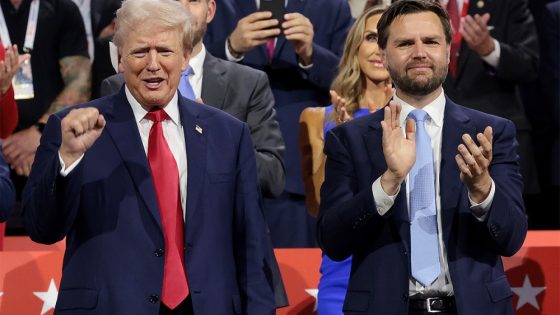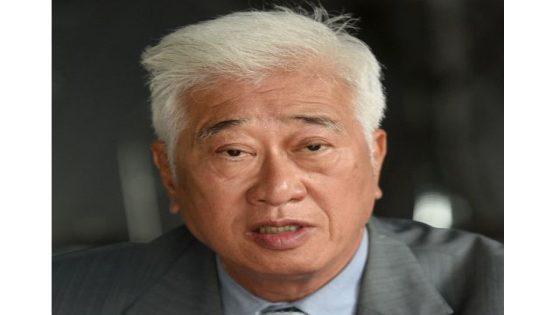On day one of the Republican National Convention, Donald Trump tapped JD Vance to be his vice-presidential running mate. And with that announcement, a four-year-old movie — the Ron Howard-directed adaptation of Vance’s memoir, “Hillbilly Elegy” — leapt almost instantly into the Netflix top 10.
For many Americans, that chicken-fried Bildungsroman will be their introduction to a veep with less than two years’ government experience. In both the book and its middling Netflix adaptation (forgettable but for a fiery turn from Glenn Close as “Mamaw,” the woman who raised young JD while his mother was dealing with drug addiction and deadbeat boyfriends), Vance portrayed himself as an Appalachian kid from poor stock who’d escaped the Rust Belt for an Ivy League education and a lucrative career.
It was that dimension of Vance’s narrative that clearly attracted director Ron Howard and producer Brian Grazer — both self-avowed liberals, who may have created a monster by legitimizing his origin story, much as “The Apprentice” producer Mark Burnett did by giving Trump a reality TV spotlight back in 2004.
Hollywood loves a Horatio Alger story, and Vance’s poor-kid-makes-good arc fits squarely into Howard and Grazer’s sweet spot. By treating the book the way they had “Cinderella Man” and “American Gangster,” the Imagine Entertainment duo contributed to the mythmaking that got Vance elected to the U.S. Senate in 2022, even as they missed what “Hillbilly Elegy” was really about. In the book, Vance used his personal experience (an upbringing that seemed the polar opposite of Trump’s) to explain the disconnect between Middle America and the coastal elites … to the coastal elites.
Ironically, in the eight years since the book was published, Vance has joined their ranks. The fact he’d left Middletown, Ohio, and managed to earn a law degree from Yale served as the author’s bona fides. But he went on to run a venture capital fund backed by Peter Thiel (who also bankrolled much of his Senate campaign), while becoming a familiar guest on cable news and a commentator for CNN.
At the time, Vance wasn’t yet a politician. He wasn’t even a Trump supporter. During a 2016 episode of “Fresh Air,” Vance quite publicly dismissed the candidate. “I can’t stomach Trump,” he told NPR host Teri Gross, adding, “I think that he’s noxious and is leading the white working class to a very dark place.” Asked who he’d vote for, Vance joked, “I might have to hold my nose and vote for Hillary Clinton.”
But that was before Clinton lumped half of all Trump supporters into a “basket of deplorables,” dissing his people in the process. Is Vance still holding his nose today, as he campaigns alongside Trump? Or, like Mike Pence before him, is he willing to compromise many of his ideals in hope of influencing Trump’s agenda?
Unlike so many of the books published in the lead-up to someone’s political candidacy — such as Barack Obama’s 2007 “The Audacity of Hope” or Kamala Harris’ 2019 “The Truths We Hold” — “Hillbilly Elegy” wasn’t written for readers of Vance’s political persuasion. Rather, it served to explain to liberals why Trump would get elected that fall, inspiring waves of parachute journalism as reporters rushed to such communities to make sense of the strange turn national politics was taking.
A media-made celebrity himself, Trump ran as an outsider to the system that had failed so many Americans, campaigning on issues that mattered to the working class, ones that career politicians on both sides were ignoring. Introducing readers to what would become Trump’s base, Vance laid out those concerns: poverty, opioid addiction, lack of access to higher education and, perhaps most importantly, entire communities where the local economy had imploded, eliminating jobs and leaving housing stagnant.
Clear and well-written, Vance’s book offered a ground-level view of how decades of liberal policies hadn’t been effective in communities like his, best reflected in his take on how honest, hard-working folks saw the food stamp system as unfair. In a way, the word “memoir” was misleading; “Hillbilly Elegy” worked better as a sociology text. On page after page, Vance argues that a vast segment of white working-class Americans has been feeling disenfranchised. Offensive as it may sound to some, the “Make America Great Again” concept appeals to voters so preoccupied with their own day-to-day reality that they aren’t nearly as focused on the rights of others — Black Americans, immigrants, welfare cases.
In Vance’s own words, “I may be white, but I do not identify with the WASPs of the Northeast. Instead, I identify with the millions of working-class white Americans of Scots-Irish descent who have no college degree. To these folks, poverty is the family tradition,” he wrote in the introduction. “Americans call them hillbillies, rednecks, or white trash. I call them neighbors, friends, and family.”
Hollywood tends to harbor a very distorted view of the sort of people described in Vance’s book (which I’ve always found strange, considering that plenty of folks working in the film industry gravitated there from similar places). “Hillbilly Elegy,” the movie, is part of a much larger genre of sweet-tea Southern coming-of-age stories — “Mommie Dearest” meets “The Andy Griffith Show,” in which a star as radiant as Amy Adams plays a bedraggled nightmare version of Vance’s seldom-present mom.
Truth be told, many faith-based films do far better justice to red-state spirit (says this Texas boy who rarely sees that resilient, trying-one’s-hardest Heartland attitude he witnessed growing up in Waco reflected onscreen). Instead, we get scenes like the one where a shotgun-waving Close rants, “If you got a problem with that you can talk to the barrel of my gun!” By contrast, the media romanticizes glamorous New York characters and careers, like sex columnist or ad man, while reducing those in “flyover” states to variations on the banjo-picking hillbillies seen in “Deliverance.”
Released the same year as “Hillbilly Elegy,” left-leaning indie filmmaker Nicole Riegel’s “Holler” felt like a more authentic version of roughly the same story, depicting how a resilient teen from a former steel town saved up enough to attend college. Elaine McMillion Sheldon’s self-distributed 2023 docu-essay “King Coal” reckons with the complicated legacy of dirty industry in Appalachia.
What nearly all these depictions have in common is the opinion that the combination of poverty and ignorance can be like quicksand, trapping many Americans in their circumstances. Hollywood typically depicts places like Vance’s Ohio hometown as communities to be escaped from. The movies inevitably end the same way: with the protagonist breaking free. But what of all those who are left behind (the Trump voters)? And what happens after?
Vance dealt with that phenomenon in his book, describing how he felt like an outsider once he got to Yale. Instead of relating to the “elites” — a favorite epithet from the right — Vance navigated the system, got his degree and then returned to his roots. Not literally, but in terms of his conservative ideals.
Speaking to Variety in 2022, Howard admitted to being surprised by Vance’s Trumpist turn. “He struck me as a very moderate center-right kind of guy,” Howard told Marc Malkin. “He apparently wasn’t interested in running for office.”
Obviously, that changed, as did Vance’s political views — or at least those he’s comfortable saying out loud. In 2016, the Middletown types he described in his book were free to project whatever they wanted upon Trump as a candidate, as the wheeler-dealer had no political experience, and therefore no track record to go by. Eight years later, the world knows what Trump stands for, and Vance has made a calculated choice to align himself with the ex-president — a strategy that paid off as he was picked to be the ultimate celebrity apprentice.
Source Agencies



